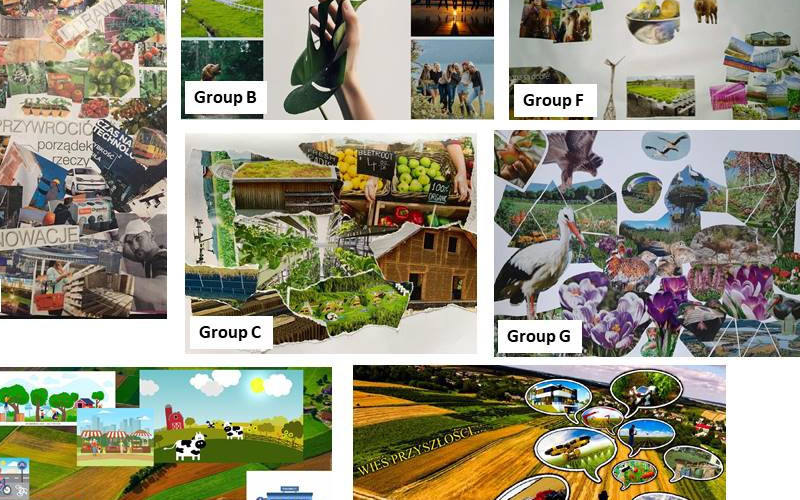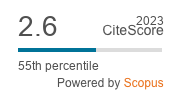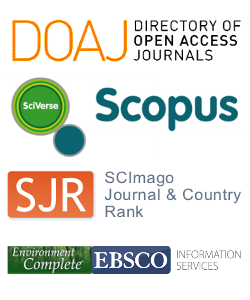“Imagine the landscape”: Challenges of online teaching and learning about landscape during the COVID-19 pandemic – Lessons for the post-pandemic period
DOI:
https://doi.org/10.3097/LO.2023.1111Keywords:
landscape-oriented courses, online education, blended learning, COVID-19 pandemic, PoznanAbstract
This paper considers how we can teach and learn about landscape in a virtual world in the post-COVID-19 period. The starting point for this research was the difficulties of teaching and learning about landscape during the pandemic, as at that time it was necessary to conduct education remotely. Online classes forced a reorientation of the hitherto widely used educational strategies and learning methods. This paper analyses students’ perceptions of remote education and reflects on the extent to which online learning can replace the real landscape. It involved bachelor’s and master’s students of Environmental Management at Adam Mickiewicz University in Poznan. These students participated in three landscape-oriented courses: ‘Development and Planning of Rural Areas’, ‘Cross-border Environmental Management’ and ‘Landscape Ecology’. Raw data was gathered using post-course surveys and both qualitative and quantitative research methods were used to analyse the data. The values that students gained from online learning of landscape were assessed, and concepts and teaching methods that might be useful in blended teaching and learning about landscape in the post-pandemic period were proposed.
References
Alturise, F. 2020. Difficulties in teaching online with blackboard learn effects of the COVID-19 pandemic in the Western Branch Colleges of Qassim University. International Journal of Advanced Computer Science and Applications, 11(5), 74–81. https://doi.org/10.14569/IJACSA.2020.0110512 DOI: https://doi.org/10.14569/IJACSA.2020.0110512
Anderson, V. 2020. A digital pedagogy pivot: Re-thinking higher education practice from an HRD perspective. Human Resource Development International, 23(4), 452-467. https://doi.org/10.1080/13678868.2020.1778999 DOI: https://doi.org/10.1080/13678868.2020.1778999
Antrop, M. 2004. Landscape change and the urbanization process in Europe. Landscape and Urban Planning, 67, 9–26. https://doi.org/10.1016/S0169-2046(03)00026-4 DOI: https://doi.org/10.1016/S0169-2046(03)00026-4
Barbour, M. K. 2015. Real-time virtual teaching: Lessons learned from a case study in a rural school. Online Learning, 19, 54–68. https://doi.org/10.24059/olj.v19i5.705 DOI: https://doi.org/10.24059/olj.v19i5.705
Bergmann, J., Sams, A. 2012. Before you flip, consider this. Phi Delta Kappan, 94(2), 25-25. https://doi.org/10.1177/003172171209400206 DOI: https://doi.org/10.1177/003172171209400206
Bernard, R. M., Abrami, P. C., Lou, Y., Borokhovski, E., Wade, A., Wozney, L., Wallet, P. A., Fiset, M., Huang, B. 2004. How does distance education compare with classroom instruction? A meta-analysis of the empirical literature. Review of Educational Research, 74(3), 379–439. https://doi.org/10.3102/00346543074003379 DOI: https://doi.org/10.3102/00346543074003379
Bovermann, K., Weidlich, J., Bastiaens, T. 2018. Online learning readiness and attitudes towards gaming in gamified online learning–a mixed methods case study. International Journal of Educational Technology in Higher Education, 15(1), 1–17. https://doi.org/10.1186/s41239-018-0107-0 DOI: https://doi.org/10.1186/s41239-018-0107-0
Burandt, A., Mölders, T. 2017. Nature–gender relations within a social-ecological perspective on European multifunctional agriculture: the case of agrobiodiversity. Agriculture Human Values, 34, 955–967. https://doi.org/10.1007/s10460-016-9763-7 DOI: https://doi.org/10.1007/s10460-016-9763-7
Carvalho, M., Nicholson, T., Yeoman, P., Thibaut, P. 2020. Space matters: framing the New Zealand learning landscape. Learning Environments Research, 23, 307–329. https://doi.org/10.1007/s10984-020-09311-4 DOI: https://doi.org/10.1007/s10984-020-09311-4
Cisani, M., Castiglioni, B., Sgard, A. 2022. Landscape and education: Politics of/in practices. Landscape Research, 47(2), 137–141. https://doi.org/10.1080/01426397.2022.2039111 DOI: https://doi.org/10.1080/01426397.2022.2039111
Dellinger, A. B. 2007. Toward a unified validation framework in mixed methods research. Journal of Mixed Methods Research, 1(4), 309-332. https://doi.org/10.1177/1558689807306147 DOI: https://doi.org/10.1177/1558689807306147
Dulamă, M. E., Ilovan, O. R. 2020. Online university education during the COVID-19 pandemic. How efficient are the adapted instruction models? Journal of Educational Sciences & Psychology, 2, 92-111.
Feliu, J., Inkeroinen, P., Markuszewska, I., Tanskanen, M., Nuss, S., Vila-Subirós, J. 2019. Defining competences for future geography students in relation to low carbon societies. Journal of Geography in Higher Education, 43(4), 1-16. https://doi.org/10.1080/03098265.2019.1660863 DOI: https://doi.org/10.1080/03098265.2019.1660863
Gewin, V. 2020. Into the digital classroom. Five tips for moving teaching online as COVID-19 takes hold. Nature, 580(7802), 295-296. https://doi.org/10.1038/d41586-020-00896-7 DOI: https://doi.org/10.1038/d41586-020-00896-7
Haaland, Ch., Fry, G., Peterson, A. 2011. Designing farmland for multifunctionality. Landscape Research, 36, 41–62. https://doi.org/10.1080/01426397.2010.536202 DOI: https://doi.org/10.1080/01426397.2010.536202
Horváth, D., Ásványi, K., Cosovan, A., Csordás, T., Faludi, J., Galla, D., Komár, Z., Markos-Kujbus, E., Endre Simay, A. 2022. Online only: Future outlooks of post-pandemic education based on student experiences of the virtual University. Society and Economy, 44(1), 2–21. https://doi.org/10.1556/204.2021.00026 DOI: https://doi.org/10.1556/204.2021.00026
Howley, P., Yadav, L., Hynes, S., Donoghue, C., Neill, S. 2014. Contrasting the attitudes of farmers and the general public regarding the ‘multifunctional’ role of the agricultural sector. Land Use Policy, 38, 248–256. https://doi.org/10.1016/j.landusepol.2013.11.020 DOI: https://doi.org/10.1016/j.landusepol.2013.11.020
Hrastinski, S. 2008. Asynchronous & synchronous e-learning. Educause Quarterly, 31(4), 51-55.
Iivari, N., Sharma, S., Ventä-Olkkonen, L. 2020. Digital transformation of everyday life – How COVID-19 pandemic transformed the basic education of the young generation and why information management research should care? International Journal of Information Management, 55, 102183. https://doi.org/10.1016/j.ijinfomgt.2020.102183 DOI: https://doi.org/10.1016/j.ijinfomgt.2020.102183
Ives, Ch., Kendal, D. 2013. Values and attitudes of the urban public towards peri-urban agricultural land. Land Use Policy, 34, 80– 90. https://doi.org/10.1016/j.landusepol.2013.02.003 DOI: https://doi.org/10.1016/j.landusepol.2013.02.003
Kamvasinou, K., Stringer, B. 2019. The politics of rurality. Landscape Research, 44(7), 783-786, https://doi.org/10.1080/01426397.2019.1641260 DOI: https://doi.org/10.1080/01426397.2019.1641260
Kee, C. E. 2021. The Impact of COVID-19: Graduate students’ emotional and psychological experiences. Journal of Human Behavior in the Social Environment, 31(1–4), 476– 488. https://doi.org/10.1080/10911359.2020.1855285 DOI: https://doi.org/10.1080/10911359.2020.1855285
Kienast, F., Gosteli, S., Edwards Jr. T. C., Martius, G. 2020. Lessons learned from the first worldwide accessible e-learning in Landscape Ecology. Landscape Online, 83, 1-14. https://doi.org/10.3097/LO.202083 DOI: https://doi.org/10.3097/LO.202083
Kumar Basak, S., Wotto, M., Belanger, P. 2018. E-learning, M-learning and D-learning: Conceptual definition and comparative analysis. E-learning and Digital Media, 15(4): 191–216. https://doi.org/10.1177/2042753018785180 DOI: https://doi.org/10.1177/2042753018785180
Lanfranchi, M., Giannetto, C. 2014. Sustainable development in rural areas: The new model of social farming. Quality – Access to Success, 15, 219-223.
Lee, K., Fanguy, M., Bligh, B., Lu, X. S. 2022. Adoption of online teaching during the COVID-19 Pandemic: a systematic analysis of changes in university teaching activity. Educational Review, 74(3), 460-483, https://doi.org/10.1080/00131911.2021.1978401 DOI: https://doi.org/10.1080/00131911.2021.1978401
Leck, C., Evans, N., Upton, D. 2014. Agriculture – Who cares? An investigation of ‘care farming’ in the UK. Journal of Rural Studies 34, 313-325. https://doi.org/10.1016/j.jrurstud.2014.01.012 DOI: https://doi.org/10.1016/j.jrurstud.2014.01.012
Leighton, J. P., Tang, W., Guo, Q. 2018. Undergraduate students’ attitudes towards mistakes in learning and academic achievement. Assessment & Evaluation in Higher Education 43(4), 612-628. https://doi.org/10.1080/02602938.2017.1387230 DOI: https://doi.org/10.1080/02602938.2017.1387230
Linton, G., Klinton, M. 2019. University entrepreneurship education: a design thinking approach to learning. Journal of Innovation and Entrepreneurship, 8(3), 1-11. https://doi.org/10.1186/s13731-018-0098-z DOI: https://doi.org/10.1186/s13731-018-0098-z
Lowenthal, P. R., Leech, N. 2009. Mixed research and online learning: Strategies for improvement. In: Kidd, T. T. (ed.), Online education and adult learning: New frontiers for teaching practices. Hershey, PA: IGI Global, Pennsylvania, pp. 202-211. DOI: https://doi.org/10.4018/978-1-60566-830-7.ch015
Manson, S., Jordan, N., Nelson, K., Brummel, R. 2016. Modelling the effect of social networks on adoption of multifunctional agriculture. Environmental Modelling & Software, 75, 388- 401. https://doi.org/10.1016/j.envsoft.2014.09.015 DOI: https://doi.org/10.1016/j.envsoft.2014.09.015
Markuszewska, I., Tanskanen, M., Vila Subiros, J. 2018. New ways to learn geography – challenges of the 21st century. Quaestiones Geographicae, 37(1), 37-45. https://doi.org/10.2478/quageo-2018-0004 DOI: https://doi.org/10.2478/quageo-2018-0004
Moorhouse, B. L. 2020. Adaptations to a face-to-face initial teacher education course ‘forced’ online due to the COVID-19 pandemic. Journal of Education for Teaching, 46(3), 1-3. https://doi.org/10.1080/02607476.2020.1755205 DOI: https://doi.org/10.1080/02607476.2020.1755205
Octaberlina, L. R., Muslimin, A. I. 2020. EFL students perspective towards online learning barriers and alternatives using Moodle/Google Classroom during COVID-19 pandemic. International Journal of Higher Education, 9(6), 1–9. https://doi.org/10.5430/ijhe.v9n6p1 DOI: https://doi.org/10.5430/ijhe.v9n6p1
OECD 2001. Multifunctionality. Towards an analytical framework. https://www.oecd-ilibrary.org/agriculture-and-food/multifunctionality_9789264192171-en [Access 22 August 2022]
Overbeek, G. 2009. Opportunities for rural–urban relationships to enhance the rural landscape. Journal of Environmental Policy and Planning, 11, 61–68. https://doi.org/10.1080/15239080902775058 DOI: https://doi.org/10.1080/15239080902775058
Pedroli, B., van Elsen, T., van Mansvelt, J. 2007. Values of rural landscapes in Europe: inspiration or by-product?. NJAS Wageningen Journal of Life Sciences, 54, 431–447. https://doi.org/10.1016/S1573-5214(07)80014-5 DOI: https://doi.org/10.1016/S1573-5214(07)80014-5
Piyatamrong, T., Derrick, J., Nyamapfene, A. 2021. Technology- mediated higher education provision during the COVID-19 pandemic: A qualitative assessment of engineering student experiences and sentiments. Journal of Engineering Education Transformations, 34, 290–297. https://doi.org/10.16920/jeet/2021/v34i0/157158. DOI: https://doi.org/10.16920/jeet/2021/v34i0/157158
Ricart, S., Kirk, N., Ribas, A. 2018. Ecosystem services and multifunctional agriculture: Unravelling informal stakeholders’ perceptions and water governance in three European irrigation systems. Environmental Policy and Governance, 29, 23–34. https://doi.org/10.1002/eet.1831 DOI: https://doi.org/10.1002/eet.1831
Scull, J., Phillips, M., Sharma, U., Garnier, K. 2020. Innovations in teacher education at the time of COVID19: an Australian perspective. Journal of Education for Teaching, 46(4), 497- 506. https://doi.org/10.1080/02607476.2020.1802701 DOI: https://doi.org/10.1080/02607476.2020.1802701
Smith, G. G., Heindel, A. J., Torres-Ayala, A. T. 2008. E-learning commodity or community: Disciplinary differences between online courses. Internet and Higher Education, 11(3-4), 152-159. https://doi.org/10.1016/j.iheduc.2008.06.008 DOI: https://doi.org/10.1016/j.iheduc.2008.06.008
Sparks, R. J. 2013. Flipping the classroom: An empirical study examining student learning. Journal of Learning in Higher Education, 9(2), 65-70.
Spataru, A., Faggian, R., Docking, A. 2020. Principles of multifunctional agriculture for supporting agriculture in metropolitan peri-urban areas: The case of Greater Melbourne, Australia. Journal of Rural Studies, 74, 34–44. https://doi.org/10.1016/j.jrurstud.2019.11.009 DOI: https://doi.org/10.1016/j.jrurstud.2019.11.009
van Huylenbroeck, G., Vandermeulen, V., Mettepenningen, E., Verspecht, A. 2007. Multifunctionality of agriculture: a review of definitions, evidence and instruments. Living Reviews in Landscape Research, 1, 5-43. https://doi.org/10.12942/lrlr-2007-3 DOI: https://doi.org/10.12942/lrlr-2007-3
Wang, Ch., Miller, D., Brown, I., Jiang, Y., Castellazzi, M. 2015. Visualisation techniques to support public interpretation of future climate change and land-use choices: a case study from N-E Scotland. International Journal of Digital Earth, 9(6), 586-605. https://doi.org/10.1080/17538947.2015.1111949 DOI: https://doi.org/10.1080/17538947.2015.1111949
Willging, P. A., Johnson, S. D. 2004. Factors that influence students’ decision to drop out of online courses. Journal of Asynchronous Learning Networks, 8(4), 105-118. https://doi.org/10.24059/olj.v13i3.1659 DOI: https://doi.org/10.24059/olj.v8i4.1814
Wilson, G. 2008. From ‘weak’ to ‘strong’ multifunctionality: Conceptualising farm-level multifunctional transitional pathways. Journal of Rural Studies, 24, 367–383. https://doi.org/10.1016/j.jrurstud.2007.12.010 DOI: https://doi.org/10.1016/j.jrurstud.2007.12.010
Zasada, I. 2011. Multifunctional peri-urban agriculture A review of societal demands and the provision of goods and services by farming. Land Use Policy, 28, 639– 648. https://doi.org/10.1016/j.landusepol.2011.01.008 DOI: https://doi.org/10.1016/j.landusepol.2011.01.008

Downloads
Published
How to Cite
Issue
Section
Categories
License
Copyright (c) 2023 Iwona Markuszewska

This work is licensed under a Creative Commons Attribution 4.0 International License.










